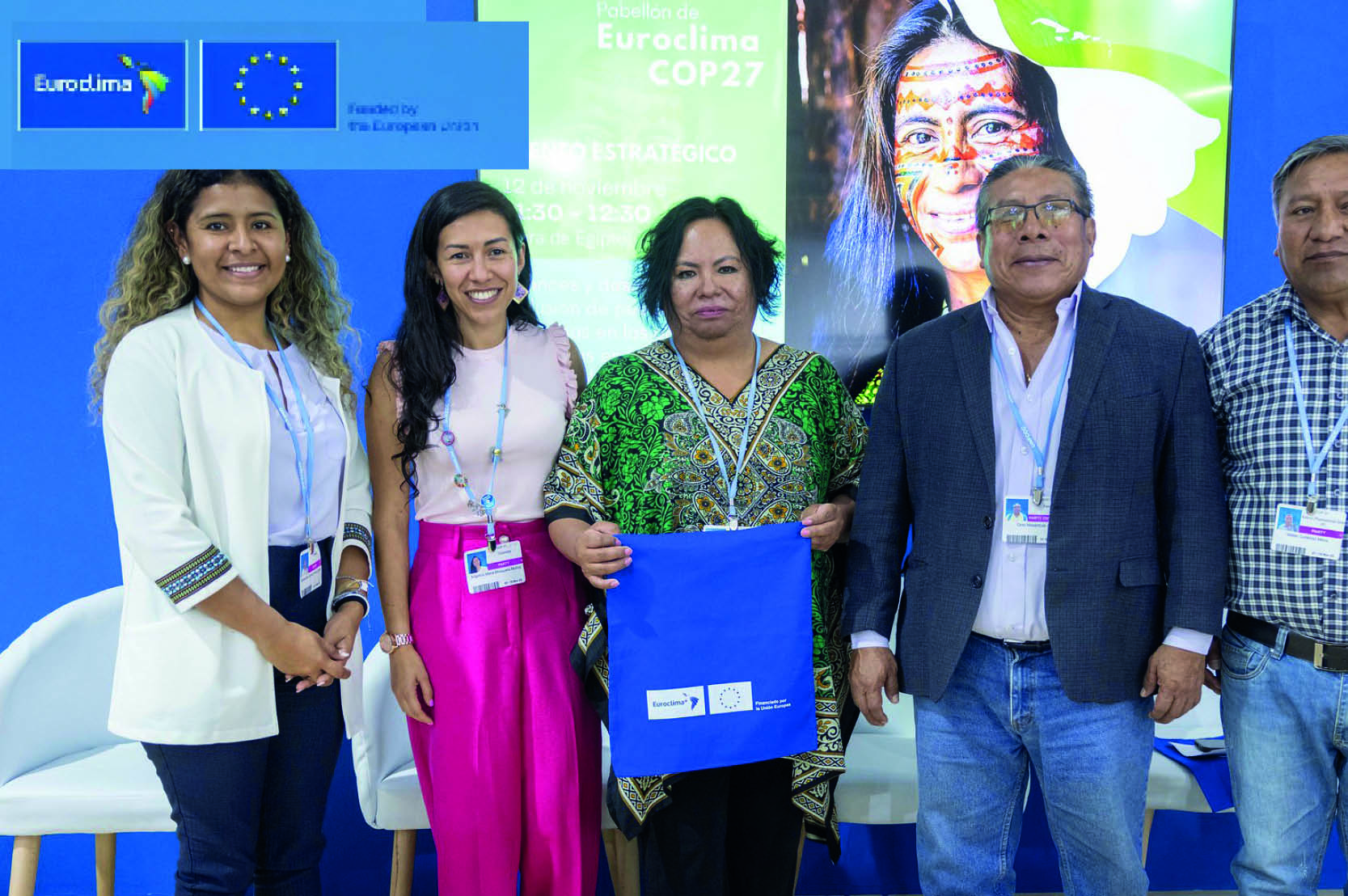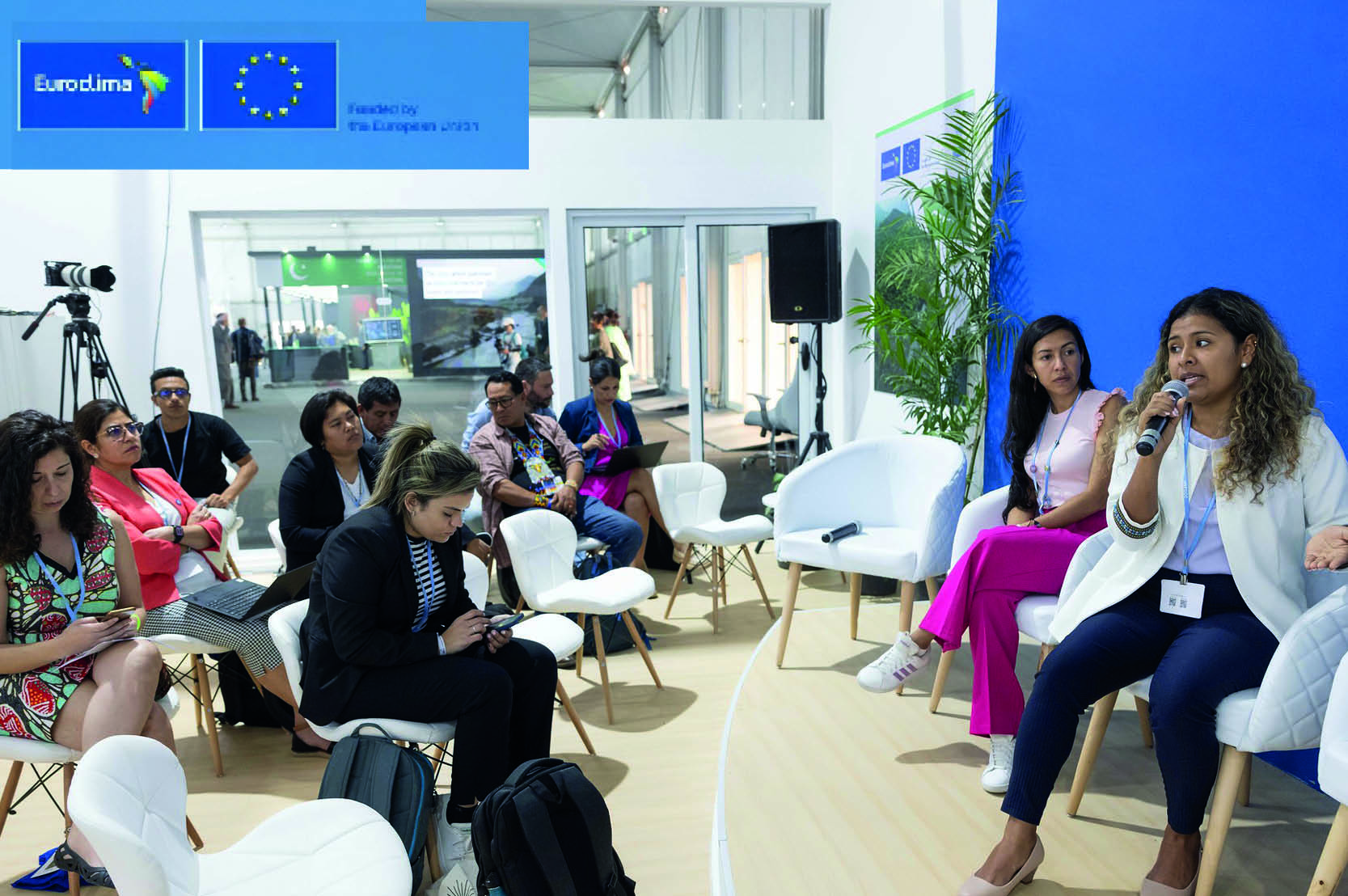At #EuroclimaCOP27 the side event "Progress and challenges of the inclusion of indigenous peoples in climate policies in the region, in the framework of the Paris Agreement" took place.
14 November 2022, Sharm-El-Seikh, Egypt. - With the aim of presenting the advances in the operationalisation of the decisions of the United Nations Framework Convention on Climate Change (UNFCCC) on strengthening the participation and contribution of Indigenous Peoples in the implementation of the Paris Agreement and climate action at the local, national and regional levels that guides the reflections on the steps to be taken to promote this process, this side event was held at the Euroclima pavilion entitled: “Advances and challenges of the inclusion of indigenous peoples in climate policies in the region, under the framework of the Paris Agreement”.

The event had three moments, at the beginning Onel Masardurle, representative for Central/South America and the Caribbean of the Facilitative Working Group of the Local Platform of Indigenous Peoples and Local Communities (LCIPP) gave a motivating and general presentation on the LCIPP, shaped in the framework of the Paris Agreement, which put into context its progress and challenges for the construction of similar processes at national and regional level.
Mr. Masardule explained the objectives of the Platform: knowledge sharing to identify best practices; enhancing capacity building for climate engagement and promoting the articulation of systems of inputs to address climate change as well as involving youth in roundtables (as has been done in pre-COP meetings).
The second part of the event was devoted to presenting the cases of countries that have made progress on the inclusion of indigenous peoples, showing their results and challenges. The presentations of the cases of Argentina, Brazil, Colombia, Costa Rica and Panama sought a regional balance of experiences in Central and South America, and of indigenous and government representation.
Leticia Cruells, Technical Advisor at the National Directorate of Climate Change of the Ministry of Environment and Sustainable Development of Argentina, stressed the importance of having specific spaces (intercultural dialogues, with indigenous peoples) and of working together from the beginning with indigenous peoples because of the unique role they play in the preparation and implementation of actions against climate change.
For her part, Sandra Akemi Kishi, Regional Prosecutor at the Federal Public Prosecutor's Office of Brazil (the only institution in the world with the mission of serving the interests of ordinary society) highlighted the fact that indigenous peoples are the ones who protect nature the most and, at the same time, the ones who suffer the most from the effects of climate change.
Next, Angélica María Mosquera, advisor in the directorate of climate change and risk management of the Ministry of Environment and Sustainable Development of Colombia, highlighted that adaptation projects always require vulnerability analysis to identify the best measures (including ancestral wisdom and scientific knowledge). Mrs. Mosquera also highlighted the challenge observed in the COP27 negotiations of the lack of participation of parties in the indigenous platform issues under the framework of the UNFCCC.
In turn, Alejandra Loria, from the National Commission for the Management of Biodiversity of Costa Rica; the anthropologist in charge of socio-cultural, indigenous and gender issues and Focal Point for Article 8j of the Convention on Biological Diversity, highlighted the need to design public policies in a participatory manner and to strengthen the conservation vision of indigenous peoples.
In her turn to speak, Maribel Pinto, from the Panamanian Ministry of Environment and head of the Adaptation Department of the Climate Change Directorate, highlighted the importance of meeting with each community to learn about their activities and the effects of climate change that most affect them, with the aim of finding appropriate solutions.
Finally, Elvira Gutierrez, coordinator of the Project for the Creation of the Indigenous and Climate Change Platform of ACTO presented the Platform, a project supported by Euroclima+; highlighting the importance of involving indigenous peoples. Ms. Gutierrez also pointed out the importance of putting the alternative from the indigenous peoples' own cosmovision to create actions and policies.
In a third moment Walter Gutierrez, alternate member of the LCIPP Facilitative Working Group for Central/South America and the Caribbean, offered some words of synthesis and general reflection that summarised the lessons learned and the challenges for the effective inclusion and participation of Indigenous Peoples in climate action at the local, national and regional levels.
Mr. Gutierrez stated that for a true participation and inclusion of indigenous peoples, prior and consensual consultation is needed.
This activity was promoted in the framework of Activity 5 of the current UNFCCC FWG Work Plan, which aims for the development of capacities of parties for the inclusion of indigenous peoples in climate policies, and has been coordinated with the GRULAC representation to the FWG.
| Walter Gutiérrez, LCIPP/ Alternate Member of the Facilitative Working Group for CA/South and the Caribbean | Juana Elvira Gutiérrez, Coordinator of the Project for the Creation of the Indigenous Platform and CC OTCA | |
|
Angélica María Mosquera, Colombian Ministry of Environment and Sustainable Development |
||
About EUROCLIMA+
EUROCLIMA+ is a programme funded by the European Union and co-financed by the German federal government through the Federal Ministry for Economic Cooperation and Development (BMZ), as well as by the governments of France and Spain through the Ministry of Foreign Affairs, European Union and Cooperation.
The Programme's mission is to reduce the impact of climate change and its effects in 18 countries in Latin America and the Caribbean, promoting mitigation, adaptation, resilience and climate investment. It is implemented according to the "Spirit of Team Europe" under the synergistic work of seven agencies: the Spanish Agency for International Development Cooperation (AECID), the AFD Group: the French Development Agency (AFD)/ Expertise France (EF), the Economic Commission for Latin America and the Caribbean (ECLAC), the International and Ibero-America Foundation for Administration and Public Policy (FIIAPP), the German Society for International Cooperation (GIZ) GmbH, and the UN Environment Programme (UNEP).
Contacts
Marina Casas CEPAL
This email address is being protected from spambots. You need JavaScript enabled to view it.

